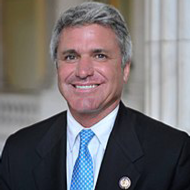
Rep. Michael McCaul
The U.S. House of Representatives on Tuesday approved 400-16 a bipartisan, pro-American business bill sponsored by U.S. Rep. Michael McCaul (R-TX) that would bolster U.S. diplomacy and commercialism globally.
“Promotion of American businesses abroad has never been more important,” said Rep. McCaul, ranking member on the U.S. House Foreign Affairs Committee, on May 7. “If America does not step up its economic engagement in the world, this vacuum will be filled by others, with a potentially devastating impact on American national security.”
Rep. McCaul in March introduced the Championing American Business Through Diplomacy Act of 2019, H.R. 1704, which would foster commercial relations with foreign countries and support United States economic and business interests abroad in the conduct of foreign policy, according to the congressional record. The bill’s seven cosponsors include U.S. Rep. Eliot Engel (D-NY).
“Promoting American business abroad means promoting American leadership, prosperity and our values,” Rep. McCaul said on the House floor prior to its vote on H.R. 1704. “It has always been, and should remain, a key component of global diplomacy.”
The congressman said that H.R. 1704 would improve U.S. economic diplomacy, facilitate greater market access for U.S. companies in emerging markets, and refocus the U.S. Foreign Service to support homeland businesses in international markets.
If enacted, H.R. 1704 also would counter what the lawmaker called predatory Chinese commercial competition.
“I can think of no better antidote to combat this predatory influence than unleashing the vitality of American values through our private sector,” Rep. McCaul said. “Creating more international opportunities for American businesses will help push back on growing Chinese influence across the globe.”
“It is time for America to fully wake up and get on the field, or we may ask ourselves later why we did not do more to contain the Chinese threat,” he said.



